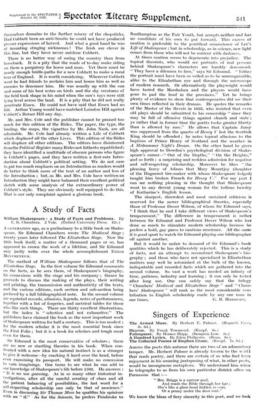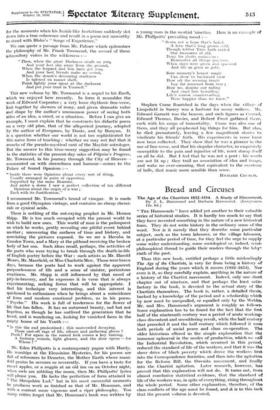Singers of Experience
The Armed Muse. By Herbert E. Palmer. (Hogarth Press.
3s. 6d.)
Heaven. By Frank Townsend. (Knopf. 6s.)
Palimpsest. By Horace Shipp. (Sampson Low. Is.)
A Hundred Lyrics. By Eden Phillpotts. (Berm. 6s.) The Collected Poems of Stephen Crane. (Knopf. Ts. 6d.) AMONG the poets this autumn there are two of an admonitory temper. Mr. Herbert Palmer is already known to the world that reads poetry, and there are certain of us who find keen enjoyment in his amazing juxtaposing of what, in other poets, would be incongruous metaphors. We understand him when he telegraphs to us from his own particular district office on Parnassus that :- " Mrs. Briggs is a narrow soul,
And reads the Bible through her hat ; She's like a glass-bead hidden in coal, Or a penny under the door-mat."
We know the blaze of fiery sincerity in this poet, and we look for the moments when his Isaiah-like hortations suddenly slot down into a true coherence and result in a poem not unworthy to stand with Blake's " Songs of Experience."
We can quote a passage from Mr. Palmer which epitomizes the philosophy of Mr. Frank Townsend, the second of these admonitory voices in the wilderness :-
" Then, when the great Darkness steals on you, And your feet slip away from the ground, When the leopard and lion have got you, And your best friends make no sound, When the desert's devouring starkness Is taloned on sunset shelf,
Point lightly your spear at the darkness And put your trust in Yourself."
This new volume by Mr. Townsend is a sequel to his Earth, which we enjoyed here recently. In form it resembles the work of Edward Carpenter ; a very loose rhythmic free-verse, knit together by skewers of irony, and given dramatic value and shape by the author's uncommon power of seeing both sides of an idea, a creed, or a situation. Before I can give an example, I must explain that he constructs his didactic poem on a very old plan, that of the allegorical journey, adopted by the author of Everyman, by Dante, and by Bunyan. It is a question whether our world is not too sophisticated for this naive form of teaching : whether we may not feel that it smacks of the pseudo-mystical cant of the Mayfair astrologer. But the answer to this time-weary suggestion may be found in the statistics of the present-day sales of Pilgrim's Progress. Mr. Townsend, in his journey through the City of Heaven— commented on with shrewdness and humour—comes to the Palace of Sound Opinions :- "Inside there were Opinions about every sort of thing, Usually arranged in pairs of opposites,
Supported by the same Reasons.
And under a dome I saw a perfect collection of ten different Opinions about the origin of a war ; Each with its Justification."
I recommend Mr. Townsend's brand of vinegar. It is made from a good Olympian vintage, and contains no cheap chemi- cals or cynical acids.
There is nothing of the out-crying prophet in Mr. Horace Shipp. He is too much occupied with the present world to wish to build new ones. This world of man is the palimpsest on which he works, gently revealing one pitiful event behind another ; uncovering the surfaces of time and history, and correlating the pictures exposed. So we see a Hecuba in Camden Town, and a Mary at the pithead receiving the broken body of her son. Such ideas recall, perhaps, the activities of the poets who were trying to break through the death-in-life of English poetry before the War ; such artists as Mr. Harold Monro, Mr. Masefield, or Miss Charlotte Mew. Those were brave days, because the poets had to work against the apparent purposelessness of life and a sense of sinister, portentous emptiness. Mr. Shipp is still influenced by that mood of pity-in-bravery, and he expresses it in verse that is always experimenting, seeking forms that will be appropriate. I find his technique very interesting, and this interest is quickened to enthusiasm when he brings about a coincidence of form and modern emotional problem, as in his poem, " Psyche." His work is full of tenderness for the flower of life that has fallen. It has an autumnal beauty, sad but not hopeless, as though he has outlived the generation that he loved, and is wandering on, looking for vanished faces in the empty house of his Youth :— " Is this the end predestined : this unrecorded decaying, These east-off rags of life, silence and gathering gloom ? Hush I For again in the rusted lock comes a key turning, A footstep sounds, light gleams, and the door opens —for Whom ? "
Mr. Eden Phillpotts is a contemporary pagan with Hardy. He worships at the Eleusinian Mysteries, for his poems are full of references to Demeter, the Mother Earth whose mani- fold genius he savours so reverently. If you have a taste for russet apples, or a noggin at an old inn on an October night, when owls are nibbling the moon, then Mr. Phillpotts' lyrics will please you. He lacks the perfection of form attained in "The Shropshire Lad," but in his most successful moments he produces work as finished as that of Mr. Housman, and with a content more vigorous and a riper philosophy. Too many critics forget that Mr. Housman's book was written by a young man in the morbid 'nineties. Here is an example of Mr. Phillpotts' prevailing mood :- " Scorn not a hope that's faded. A love that's long grown cold. Though robber Time bath raided Our treasuries of old,
Deny his thefts audacious Remember all things gracious. When days were green and spacious And life as good as gold.
Sure memory's honest magic Can show to backward view How oft the seeming tragic,
Lay fur removed from true ; -How we, despite our railing
And cruel fate bewailing, Life's sorrow countervailing, - Were happier than we knew."
Stephen Crane flourished in the days when the village of Limpsfield in Surrey was a harbour for many writers. Mr. Edward Garnett was the beacon, and such figures as Conrad, Edward Thomas, Davies, and Robert Frost gathered there, cads with his cargo of immortality. Crane was also one of them, and they all prophesied big things for him. But alas, he died prematurely, leaving a few magnificent stories to vindicate his friends' faith. His experiments in verse have now been collected. They show that he was a pioneer in the Use of free-verse, and that his singular character, so exquisitely susceptible to the pain and injustice of life, must stamp itself on all he did. But I feel that he was not a poet. : his words are not lit up ; they trail no association of idea and image, and wake no over-meaning, that equivalent to the overtone of bells, that music more sensible than sense.
RICHARD CHURCII.

























































 Previous page
Previous page